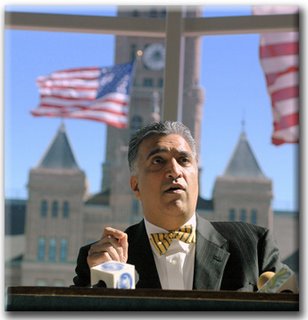Poll: Middle class voters abandoning GOP
By LIZ SIDOTI and TREVOR TOMPSON, Associated Press Writers 1 hour, 30 minutes ago
WASHINGTON - The 2006 election is shaping up to be a repeat of 1994. This time, Democrats are favored to sweep Republicans from power in the House after a dozen years of GOP rule.
Less than two weeks before the Nov. 7 election, the latest Associated Press-AOL News poll found that likely voters overwhelmingly prefer Democrats over Republicans. They are angry at
President Bush' name=c1> SEARCH
News News Photos Images Web' name=c3>
President Bush and the Republican-controlled Congress, and say
Iraq' name=c1> SEARCH
News News Photos Images Web' name=c3>
Iraq and the economy are their top issues.
At the same time, fickle middle-class voters are embracing the Democratic Party and fleeing the GOP — just as they abandoned Democrats a dozen years ago and ushered in an era of Republican control.
"I don't think the Republican Party represents what I stand for. The guys I golf with, we're in the middle class, we're getting hurt," says Joseph Altland, 73, a retired teacher in York, Pa. He is a registered Republican but says he is considering becoming an independent.
The AP-AOL News telephone poll of 2,000 adults, 970 of whom are likely voters, was conducted by Ipsos from Oct. 20-25.
In it, 56 percent of likely voters said they would vote to send a Democrat to the House and 37 percent said they would vote Republican — a 19-point difference. Democrats had a 10-point edge in early October.
"I don't care if I vote for Happy the Clown, just so it's not who's there now," said Mary Nyilas, 51, an independent voter from Cologne, N.J. She said she would do everything she could to "vote against the powers that put us in this situation" in Iraq.
In the minority, Democrats need to gain 15 seats in the House and six in the Senate to win control of Congress. They are arguing for a change in leadership and trying to tap into intense public anxiety about the Iraq war as well as discontent with Bush and the Republicans in charge of the House and Senate.
The 2006 election has been likened to 1994, when backlash against the controlling party — then the Democrats — triggered the election of new rulers — in that case, the Republicans.
On Thursday, House Speaker
Dennis Hastert' name=c1> SEARCH
News News Photos Images Web' name=c3>
Dennis Hastert, R-Ill., dismissed talk of a sour outlook for the GOP and cited signs of a strong economy. "Things are looking pretty good, and I don't think anybody would really want to change that at this time," he said in Aurora, Ill.
One of Hastert's lieutenants, Rep. Philip English (
news,
bio,
voting record), R-Pa., said that while he senses "a strong anti-Washington blowback ... the conclusion that, therefore, this is going to be an election like '94 or that control of Congress is likely to shift, I don't think is warranted yet. I think this is gong to come down to the wire."
Unlike in 1994 when the GOP offered a policy platform, English said, Democrats "seem unable to unite behind a common theme."
Democrats say history is on their side.
"Every decade, the American people at some point get angry at Washington for the course they've chosen and the results of that course," said Rep. Rahm Emanuel (
news,
bio,
voting record), the head of the House Democrats' campaign effort, rattling off various election years and circumstances that infuriated voters in each.
This year, he said: "it's a failed strategy in Iraq and a failed economic agenda here at home, and that's what this election is about."
Overall, the picture looks bleak for Republicans.
Likely voters have low opinions of both Bush's job performance and that of the GOP-controlled Congress. The president's approval rating is at a dismal 38 percent while Congress' is even lower — 23 percent. Two-thirds of adults say America is on the wrong track.
"The country's in a big, big mess," said Cynthia Leininger, 44, a homemaker in Wilson, N.Y., who says she leans toward Democrats. "I'm looking for change."
Voters have grown increasingly angry at the Bush administration and Republican leadership in Congress throughout October.
Only 12 percent of likely voters say they are enthusiastic about the administration. The percentage of those who say they are angry with it has grown to 40 percent from 32 percent in early October. As for the GOP-controlled Congress, 32 percent of likely voters call themselves angry, up from 28 percent.
Groups of voters who grew more angry throughout the month include: women, minorities, liberals, moderates, Democrats and people who voted for Sen.
John Kerry' name=c1> SEARCH
News News Photos Images Web' name=c3>
John Kerry, D-Mass., for president in 2004.
In 1994, exit polls found that a majority of voters were dissatisfied with the federal government, with two in 10 reporting they were angry. Voters now are twice as likely to be angry at the current administration.
The AP-AOL News poll shows Democrats remain tied with Republicans on who would best protect the country, but Democrats have a 15 percentage point advantage on which party would best handle the situation in Iraq.
On that front, nine in 10 likely voters call Iraq a very or extremely important issue to them personally, pushing it to the top of a list of topics voters care deeply about.
"I'm just not seeing a lot of progress," frets Kimberly Froeschner, 34, a GOP-leaning independent in Raleigh, N.C. She said she has grown frustrated with Iraq in the past year and feels "it's more about oil."
Aside from the level of voter anger, the other dynamic that invites comparisons to 1994 is the attitude of middle-class voters — those earning less than $75,000 a year and who have graduated high school or have some college education.
In 1994, these voters deserted the Democrats in droves, helping Republicans capture dozens of Democratic-held House seats to seize control for the first time in decades.
Democrats recovered some of that lost ground in the following years, but they never fully regained their grasp on the middle class. In the intervening midterm elections, Democrats and Republicans split the House vote among middle-income and middle-education groups.
This fall, however, the AP-AOL News poll shows that Democrats have an advantage — in some cases in the double digits — among middle-class voters.
A majority of middle-class voters now favor Democrats to control the House and say that Democrats best represent their most closely held beliefs. They trust Democrats more than Republicans to handle the situation in Iraq, which most of them view as a mistake. The war is this voting group's most important issue. The economy and health care are close behind.
Like voters of all stripes, the middle class is angry with Bush and GOP leaders on Capitol Hill — and these voters could take out their fury out on the controlling party at the ballot box as they did in 1994.
The poll has a margin of error of plus or minus 2 percentage points for all adults and 3 percentage points for likely voters.
___
Associated Press writers Will Lester and Kasie Hunt, and news survey specialist Dennis Junius contributed to this report.
___
On the Net:
Ipsos:
http://us.rd.yahoo.com/dailynews/ap/ap_on_el_ge/storytext/election_ap_poll/20737691/SIG=1104qgugc/*http://www.ap-ipsosresults.com






 Sim Gill / David Yocom
Sim Gill / David Yocom